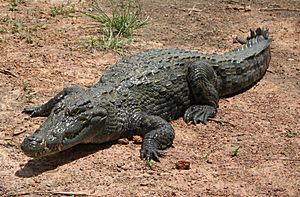West African crocodile facts for kids
Quick facts for kids West African crocodile |
|
|---|---|
 |
|
| Specimen in Bazoulé, Burkina Faso | |
| Scientific classification |
|
| Kingdom: | Animalia |
| Phylum: | Chordata |
| Class: | Reptilia |
| Order: | Crocodilia |
| Family: | Crocodylidae |
| Genus: | Crocodylus |
| Species: |
C. suchus
|
| Binomial name | |
| Crocodylus suchus Geoffroy, 1807
|
|
| Script error: The function "autoWithCaption" does not exist. | |
| Synonyms | |
|
|
Script error: No such module "Check for conflicting parameters".
The West African crocodile (Crocodylus suchus), also known as the desert crocodile, is a special type of crocodile. These amazing reptiles are known for living in the drier parts of Africa, sometimes even in the Sahara Desert! They are related to other crocodiles but have some unique features that help them survive in their environment.
Contents
Where West African Crocodiles Live
West African crocodiles can be found across a large area of West and Central Africa. Their home stretches from countries like Mauritania and Senegal in the west, all the way to South Sudan and Uganda in the east. They also live south into the Democratic Republic of the Congo.
You can find these crocodiles in many different countries, including:
- Benin
- Burkina Faso
- Cameroon
- Central African Republic
- Chad
- Republic of Congo
- Ivory Coast
- Equatorial Guinea
- Gabon
- Gambia
- Ghana
- Guinea
- Guinea-Bissau
- Liberia
- Mali
- Niger
- Nigeria
- Sierra Leone
- Togo
These crocodiles often live near rivers, lakes, and swamps, but they are also known to live in more desert-like areas, which is why they are sometimes called "desert crocodiles."
What West African Crocodiles Look Like
West African crocodiles are large reptiles, just like other crocodiles. They have strong bodies, powerful tails, and sharp teeth. Their skin is tough and scaly, which helps protect them. They are usually a greenish-brown color, which helps them blend in with their surroundings in the water and on land.
One interesting thing about them is how they are different from the more common Nile crocodile. Scientists used to think they were the same, but now we know they are a separate species! They tend to be a bit smaller than Nile crocodiles and have some subtle differences in their skull and scales.
How West African Crocodiles Live
West African crocodiles are predators, meaning they hunt other animals for food. They are very good at ambushing their prey. They often wait quietly in the water, with only their eyes and nostrils showing, until an unsuspecting animal comes close. Then, they strike quickly!
They eat a variety of animals, including:
- Fish
- Birds
- Mammals that come to the water's edge
- Other reptiles
These crocodiles are important to their ecosystems because they help control the populations of other animals. They are also known to be quite shy compared to some other crocodile species.
Life Cycle and Reproduction
Like all crocodiles, West African crocodiles lay eggs. The female crocodile builds a nest, often a mound of sand or vegetation, where she lays her eggs. She then guards the nest carefully to protect her eggs from predators.
Once the baby crocodiles hatch, they are very small and vulnerable. The mother crocodile often helps them get to the water and protects them for a while. As they grow, they become more independent and learn to hunt for themselves. It takes many years for a young crocodile to grow into a large adult.
Images for kids
-
CT scan of a crocodile mother with juveniles on its back
-
Bust of Sobek, the ancient Egyptian crocodile god
See also
 In Spanish: Cocodrilo africano occidental para niños
In Spanish: Cocodrilo africano occidental para niños
 | Tommie Smith |
 | Simone Manuel |
 | Shani Davis |
 | Simone Biles |
 | Alice Coachman |




